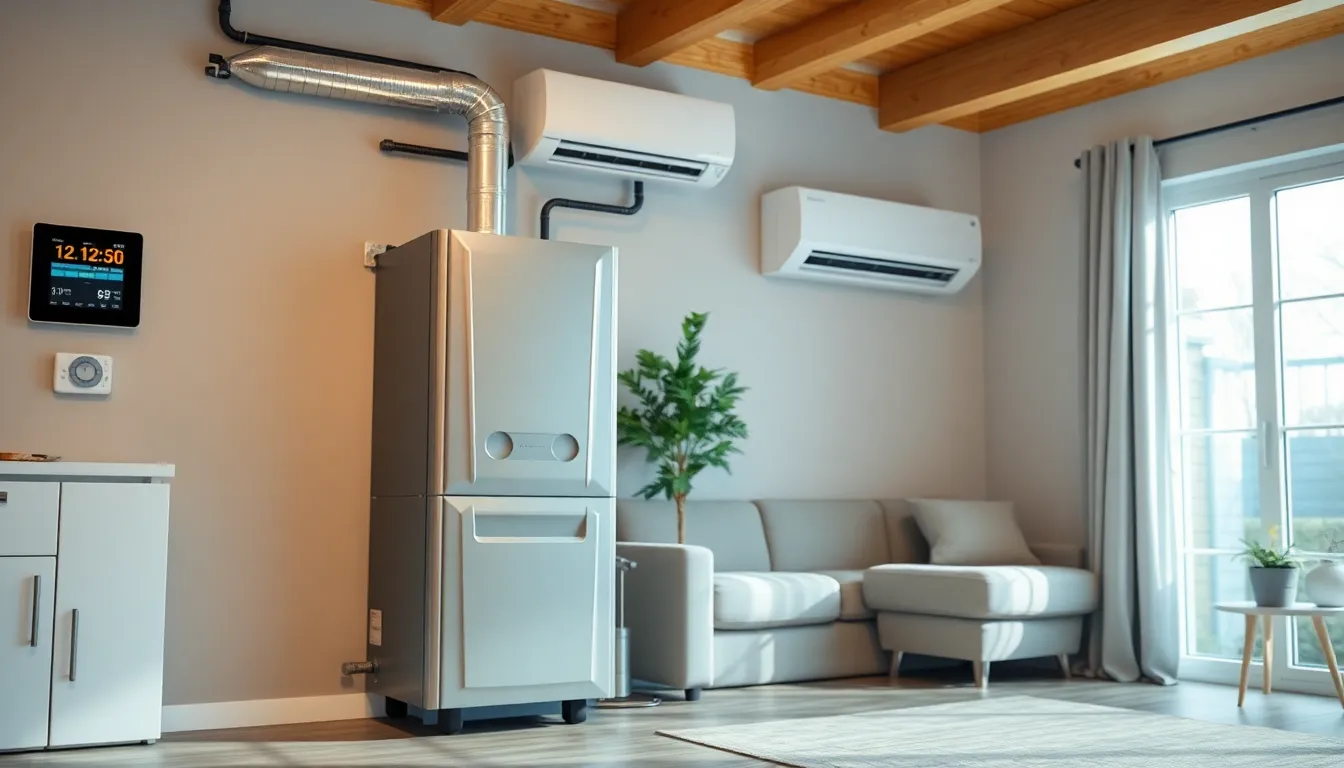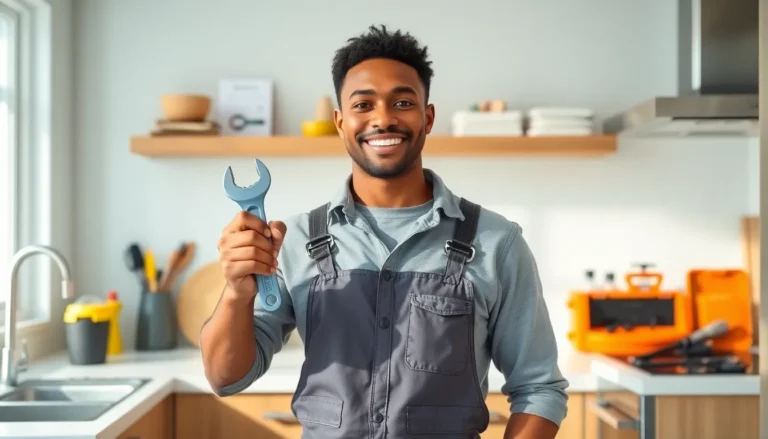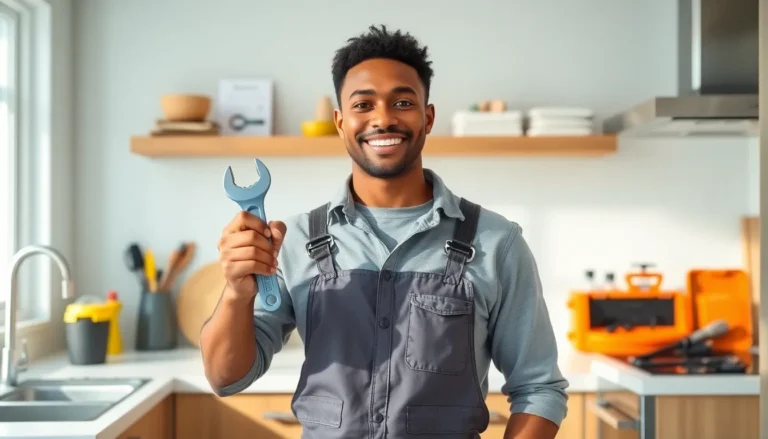Home mechanics might sound like a superhero squad for your house, but it’s really just the unsung heroes of heating and cooling, plumbing, and electrical systems. When the temperature soars or plunges, when pipes decide to burst at the worst possible moment, or when the lights flicker like a disco party gone wrong, it’s these skilled trades that come to the rescue.
Understanding these systems isn’t just for the pros; it’s essential for every homeowner. A little knowledge can save a lot of headaches—and cash. So whether you’re looking to fix that leaky faucet or finally tackle that mysterious electrical issue, dive into the world of home mechanics. It’s not just about fixing problems; it’s about keeping your home running smoothly and efficiently. Plus, who wouldn’t want to impress their friends with their newfound handyman skills?
Table of Contents
ToggleOverview of Home Mechanics
Home mechanics encompass essential skilled trades that handle heating and cooling, plumbing, and electrical systems. Familiarity with these systems equips homeowners to manage maintenance effectively. Understanding heating and cooling systems helps in adjusting temperatures, increasing comfort, and reducing energy costs.
Plumbing systems require attention to minimize leaks and ensure proper drainage. Knowledge of common plumbing issues, such as clogs or dripping faucets, provides a homeowner with the confidence to tackle minor repairs.
Electrical systems involve understanding circuits, outlets, and safety precautions. Familiarity with basic electrical skills facilitates changing light fixtures or resetting breakers. Awareness of electrical safety helps prevent hazardous situations, making it crucial for every homeowner.
Common home maintenance tasks relate to these mechanics, including routine inspections and preventive measures. Regular maintenance aids in spotting potential issues early, saving homeowners money in repairs over time. Engaging in hands-on tasks not only reinforces skills but also fosters a sense of accomplishment.
Homeowners should prioritize learning about these systems. Informed homeowners can either prevent problems or handle them promptly when they arise, resulting in a more efficient living space. Exploring resources, such as workshops or online tutorials, can expand knowledge and capabilities further.
Developing a strong foundation in home mechanics empowers individuals. This understanding ultimately contributes to a healthier, safer, and more enjoyable home environment.
Heating and Cooling Systems

Understanding heating and cooling systems impacts comfort and efficiency in a home. Homeowners should be familiar with various types of systems available and their functions.
Types of Heating Systems
Furnaces are common heating systems that use gas, oil, or electricity to warm air. Boilers, another option, heat water and distribute it via pipes to radiators or underfloor systems. Heat pumps operate by transferring heat from outside sources, providing efficient heating in moderate climates. Electric heaters deliver warmth with minimal installation requirements. Each system has unique advantages, so it’s crucial to assess specific needs before selection.
Types of Cooling Systems
Central air conditioning systems circulate cool air throughout a home via ducts. Window units, ideal for smaller spaces, cool individual rooms effectively. Split systems combine indoor and outdoor units, providing flexibility and efficient cooling solutions. Portable air conditioners offer mobility and targeted cooling without permanent installation. Assessing the size and layout of a home ensures effective cooling for every space.
Plumbing Essentials
Plumbing systems play a crucial role in home mechanics, impacting comfort and functionality. Understanding plumbing essentials helps homeowners tackle repairs and maintain their systems effectively.
Common Plumbing Issues
Leaks represent a frequent concern for homeowners, often appearing in pipes, faucets, or toilets. Clogs can occur in sinks or drains, resulting from debris buildup or grease accumulation. Low water pressure may indicate hidden leaks or mineral buildup in pipes. Running toilets waste water, possibly due to faulty flappers or fill valves. Lastly, pipe corrosion weakens integrity, increasing the risk of leaks or bursts.
Maintenance Tips for Plumbing
Inspecting pipes regularly helps identify leaks before they escalate. Cleaning drain stoppers prevents clogs by keeping debris out. Using strainers in sinks and tubs also reduces the risk of blockage. Flushing toilets monthly maintains optimal function and efficiency. Maintaining water heaters through annual inspections extends their lifespan. Finally, winterizing outdoor faucets prevents freezing and potential bursts.
Electrical Systems
Understanding electrical systems helps homeowners tackle various tasks safely and effectively. Familiarity with core components enhances home maintenance proficiency.
Basic Electrical Components
Common electrical components include outlets, switches, circuit breakers, and light fixtures. Outlets provide power access to appliances and devices. Switches control the flow of electricity to fixtures and outlets. Circuit breakers protect the wiring by interrupting electrical flow when necessary, preventing overloads. Light fixtures illuminate spaces, with bulbs varying in type and efficiency. It’s essential to know the specific roles of these elements for efficient system management.
Safety Measures for Home Electrical Work
Safety measures are crucial during any electrical work. Always turn off power at the main circuit breaker before starting repairs. Wear insulated gloves to protect against electric shock. Utilize non-contact voltage testers to confirm that wires are de-energized before handling. Tackling repairs requires keeping a first aid kit nearby for emergencies. Lastly, understand local codes and regulations to ensure compliance when performing any electrical work.
Mastering home mechanics can transform a homeowner’s experience. By understanding heating and cooling, plumbing, and electrical systems, individuals can tackle everyday challenges with confidence. This knowledge not only enhances comfort but also fosters a proactive approach to maintenance.
Engaging in regular inspections and minor repairs can lead to significant savings on costly repairs down the line. Moreover, the sense of accomplishment that comes from successfully addressing home issues can be incredibly rewarding.
With resources readily available, anyone can become more skilled in these essential areas. Embracing this journey not only improves a home’s functionality but also empowers homeowners to create a safer and more enjoyable living space.




